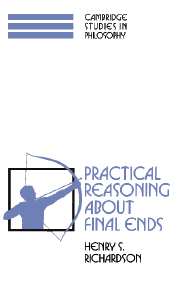XI - Interpersonal deliberation
Published online by Cambridge University Press: 05 June 2012
Summary
There are both defensive and constructive reasons to try to extend my account of deliberation of ends to explicitly interpersonal contexts. To begin with the obvious positive reasons, the nature of interpersonal deliberation is of interest in its own right, both philosophically and practically. Much actual deliberation is interpersonal. Even when a single individual is deciding what to do with his or her life, he or she may seek advice from others and deliberate with them about some personal choice. More strictly interpersonal are the discussions within groups and institutions of various kinds about what that body will do. As a practical matter, we would like to know to what extent the theory of individual deliberation developed in the last chapters can apply to the setting of ends in these interpersonal settings. Whether the general account of rational deliberation of ends I have developed can extend to interpersonal settings is not the same question as whether it can be objective. Philosophically, however, interpersonal deliberation is of interest not only because of the structural problems posed by interpersonal settings, but also because as we try to extend the theory of individual deliberation to the interpersonal setting, additional scope for objectivity will enter. I do not mean to imply that intersubjectivity is equivalent to objectivity; but if there is some correlation between the two, then the attempt to work out an intersubjectively acceptable understanding of final ends would require attaining a greater degree of objectivity than does an individual's deliberation of ends.
- Type
- Chapter
- Information
- Practical Reasoning about Final Ends , pp. 231 - 249Publisher: Cambridge University PressPrint publication year: 1994



